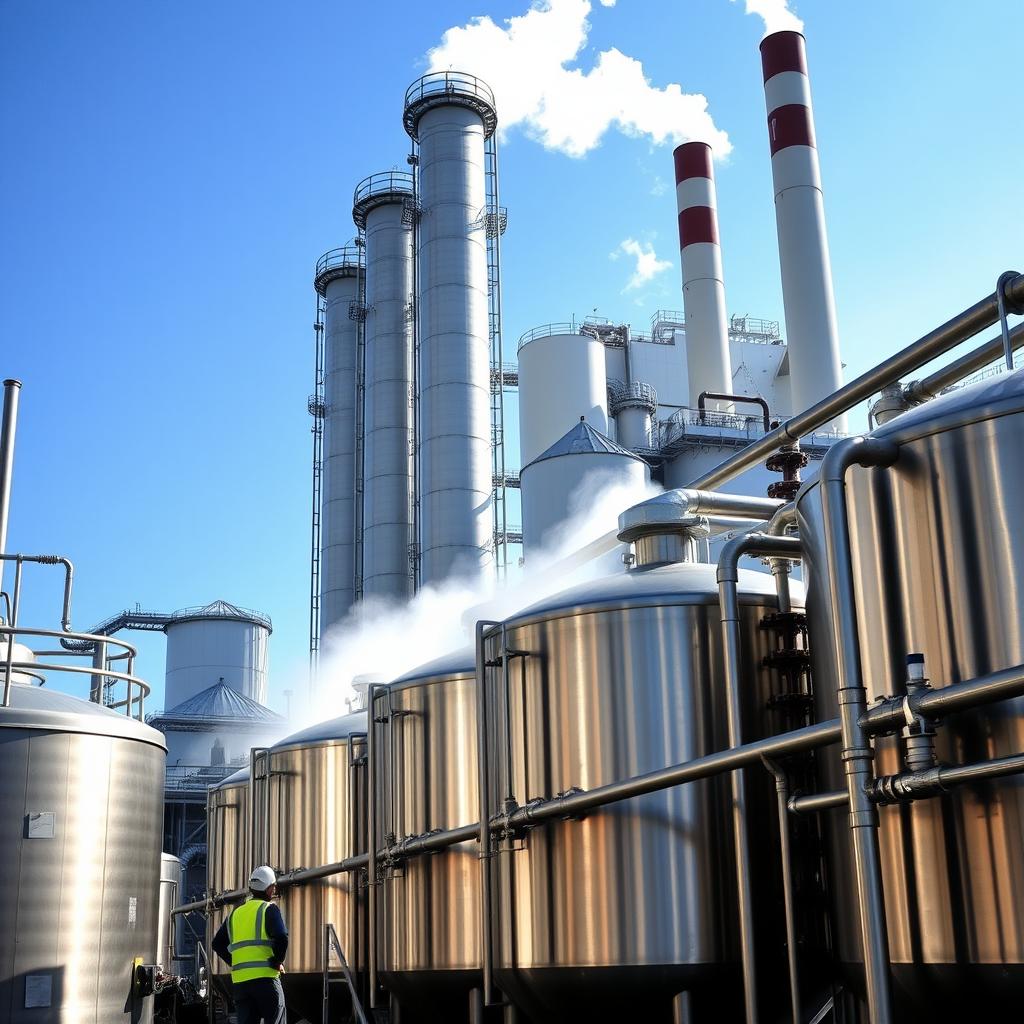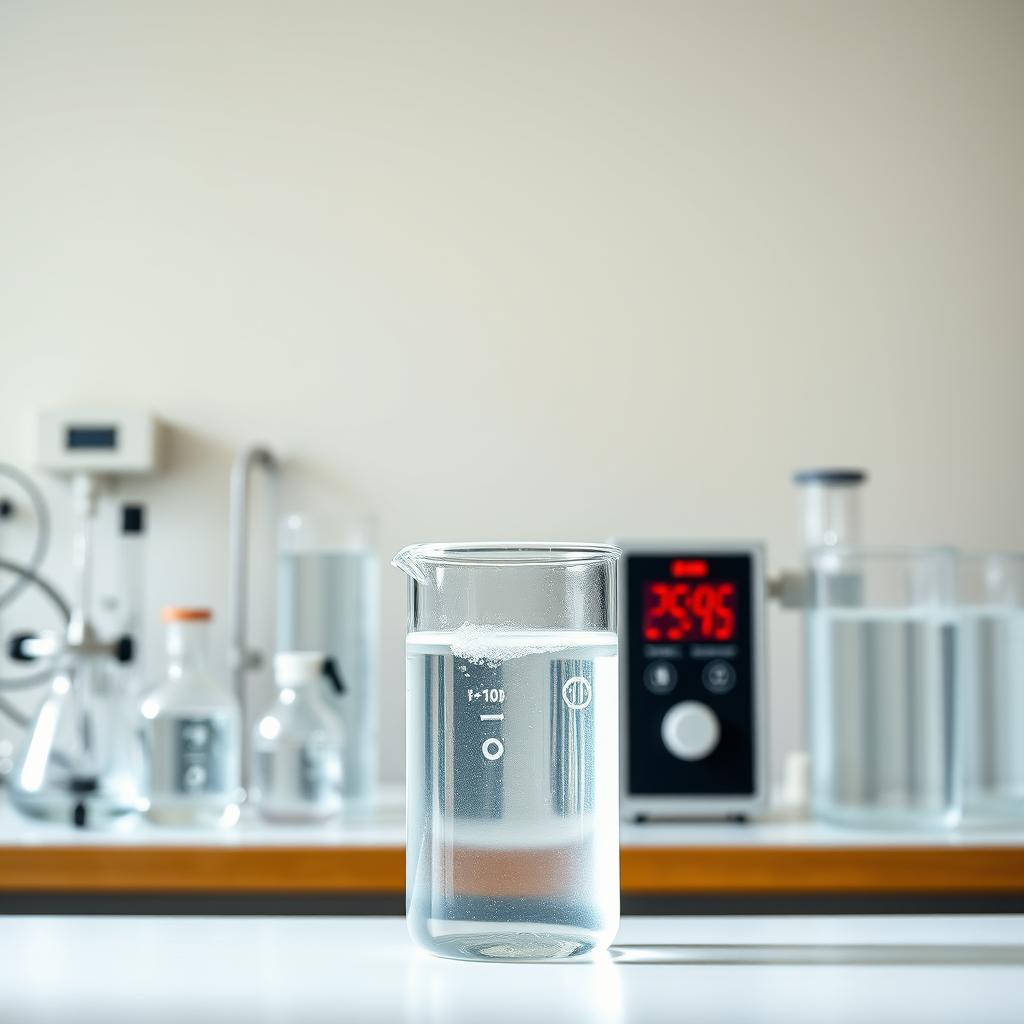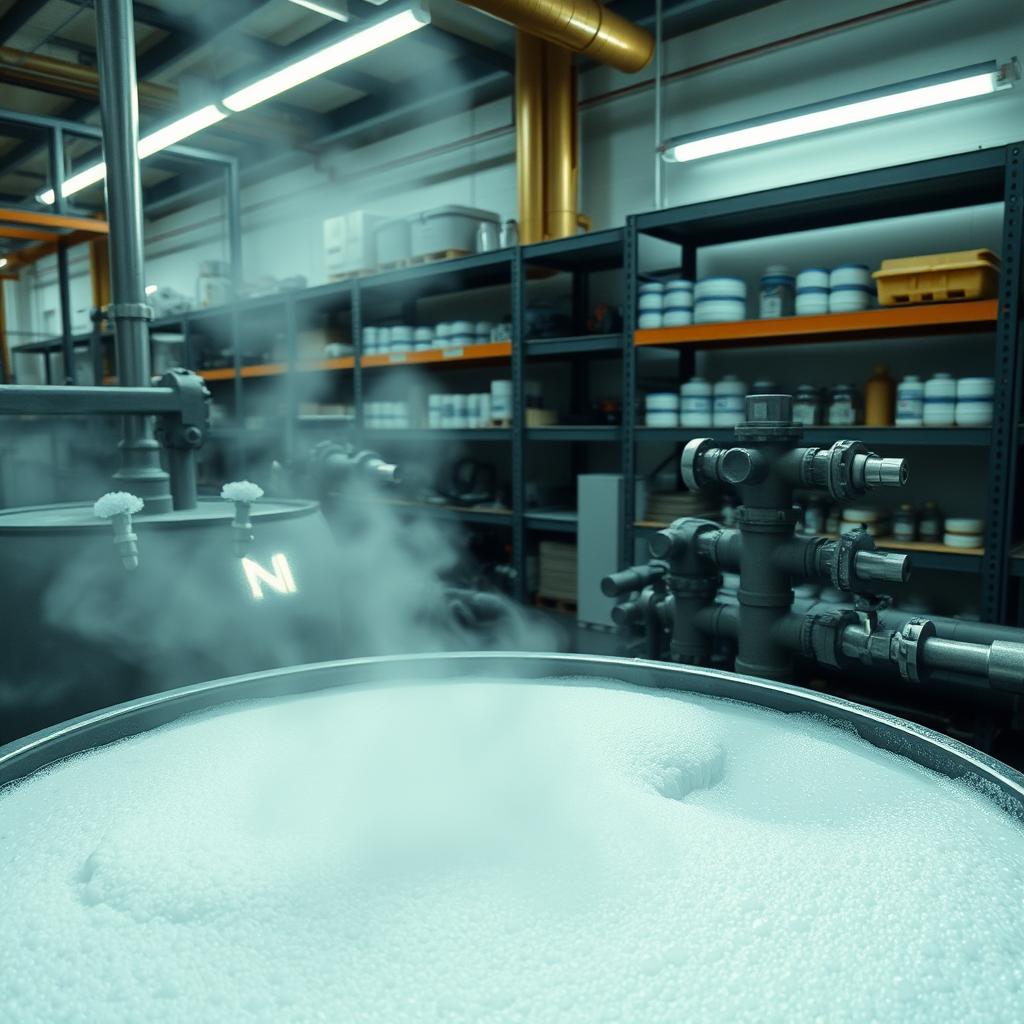Hydrogen peroxide is key in many industries, from chemical processing to healthcare. Its special properties make it useful in many ways. It’s used in water treatment, electronics, and more, showing its value in industry. Hydrogen peroxide is vital in many manufacturing steps. As industries grow, so will the need for hydrogen peroxide. Knowing how it’s used helps us see its big role in today’s world.
Key Takeaways:
- Hydrogen peroxide has a wide range of industrial applications, including chemical processing and water treatment.
- Its unique properties make it an essential component in various manufacturing processes.
- The industrial uses of hydrogen peroxide are diverse and continue to expand.
- Hydrogen peroxide plays a crucial role in electronics manufacturing and healthcare.
- Its importance in industrial settings is driven by its effectiveness and versatility.
- The demand for hydrogen peroxide is likely to increase as industries continue to evolve and grow.
Understanding Hydrogen Peroxide in Industrial Applications
Hydrogen peroxide is a versatile compound used in many industries. Its unique properties make it key in processes like water treatment and chemical manufacturing. Its effectiveness and environmental benefits have boosted its use in industries. Hydrogen peroxide’s strong oxidizing power is valuable in many industrial processes. There are different grades of hydrogen peroxide, each with its own uses. Knowing these properties and grades is important for choosing the right hydrogen peroxide for a job.
Chemical Properties and Industrial Grades
Hydrogen peroxide has key chemical properties like concentration, pH level, and stability. These properties impact its performance and safety in industries. The different grades of hydrogen peroxide vary in concentration, purity, and use.
Safety Considerations for Industrial Use
Handling hydrogen peroxide safely is crucial in industries. This means wearing protective gear, ensuring good ventilation, and following storage and handling rules. Safe use of hydrogen peroxide is key to preventing accidents and keeping a healthy work environment.
Storage and Handling Requirements
Storing and handling hydrogen peroxide requires careful attention. It should be stored in well-ventilated areas, away from heat and incompatible materials. Using proper equipment for handling is also important. These steps help industries use hydrogen peroxide safely and effectively.

In conclusion, knowing the chemical properties, grades, safety, and handling of hydrogen peroxide is vital. By choosing the right type and following safety protocols, industries can benefit from hydrogen peroxide while reducing risks.
Pulp and Paper Industry Applications
The pulp and paper industry greatly benefits from hydrogen peroxide. It is used to make paper products better. Hydrogen peroxide helps make paper brighter and stronger. Hydrogen peroxide is key in the pulp and paper industry. It is used for:
- Bleaching pulp to make bright paper
- Delignifying wood chips for pulp
- Making special papers like tissue and packaging
Using hydrogen peroxide helps the environment too. It cuts down on harmful chemicals. This means less pollution. Because of these benefits, hydrogen peroxide is a top choice. Companies use it to make better products and protect the environment.
| Application | Benefits |
|---|---|
| Bleaching of pulp | Improved brightness and strength of paper products |
| Delignification of wood chips | Increased efficiency in pulp production |
| Production of specialty papers | Enhanced quality and performance of paper products |
Hydrogen peroxide brings many advantages to the pulp and paper industry. It improves product quality and helps the environment. As the industry grows, hydrogen peroxide will likely be even more important.

Water Treatment and Environmental Solutions
Hydrogen peroxide is key in water treatment, offering a strong and green way to clean water and treat wastewater. It’s known for its power to remove pollutants without leaving harmful leftovers. This makes it a top choice for keeping water clean. In cities, hydrogen peroxide helps get rid of bad stuff in water. It breaks down organic pollutants, making water safer. Using it is good for the environment and improves water quality.
- Effective removal of organic pollutants
- Improvement of water quality
- Environmentally friendly alternative to traditional treatment methods
Hydrogen peroxide also helps in industrial and groundwater cleanup. It’s great at breaking down pollutants and cleaning up contaminated areas. Its success in these areas has made it a favorite for water and environmental projects.
As we need more clean water, hydrogen peroxide’s role will grow. It’s a safe and effective way to treat water. This makes it crucial for a greener future.
Chemical Processing and Manufacturing
Hydrogen peroxide has many uses in the chemical processing and manufacturing world. It helps make products better by improving efficiency and quality. Its ability to help in many chemical reactions makes it very important.
In making specialty chemicals, hydrogen peroxide is a key player. It helps create valuable products. It also plays a big role in making medicines, helping reactions happen smoothly. Hydrogen peroxide is also used in making everyday items. It’s great for cleaning and making things safe. Using it helps make products better and more efficient.
- Improved product quality
- Increased efficiency
- Enhanced yield
- Reduced environmental impact
As more people need hydrogen peroxide, its uses will grow. It’s a key player in making many chemicals and products. Its benefits will keep it important in the future.

Electronics and Semiconductor Manufacturing
Hydrogen peroxide is key in cleaning electronics and semiconductors. Its strong oxidizing properties make it perfect for many uses. In these fields, hydrogen peroxide helps ensure electronic products are top-notch. Hydrogen peroxide is used in three main areas: cleaning circuit boards, processing silicon wafers, and treating metal surfaces. It’s great at removing dirt, etching surfaces, and improving adhesion. These are all crucial for making high-quality electronic parts.
Circuit Board Cleaning
Circuit boards are essential for most electronic devices. They need careful cleaning to remove flux residues and other contaminants. Hydrogen peroxide is effective in this task, dissolving and removing these without harming the board’s components.
Benefits of Hydrogen Peroxide in Electronics Manufacturing
Using hydrogen peroxide in electronics manufacturing has many benefits. It boosts product reliability by ensuring components are clean. It’s also better for the environment than other cleaners. Plus, it can save money by simplifying cleaning processes.
In short, hydrogen peroxide is crucial in electronics and semiconductor manufacturing. It offers a versatile and effective solution for many tasks. Its uses keep growing, thanks to its strong oxidizing properties and the benefits it brings to the manufacturing process.
Textile and Fabric Industry Applications
The textile and fabric industry is using hydrogen peroxide more and more. It’s great for bleaching, disinfecting, and dyeing. Hydrogen peroxide makes colors look the same, strengthens fabrics, and is good for the environment. It works well with cotton, wool, and synthetic fibers. Using hydrogen peroxide in textiles has many benefits. For example:
- It makes colors look the same and strengthens fabrics.
- It’s good for the environment because it breaks down easily.
- It’s cheaper than other bleaching agents.
Hydrogen peroxide is also used to make denim look faded. This is a big trend in fashion. Many brands use it to make their clothes look unique.
Hydrogen peroxide is not just for bleaching and dyeing. It’s also used to kill bacteria and other germs. This keeps fabrics from getting damaged. Because of its many benefits, hydrogen peroxide is becoming more popular in the textile industry.
| Fabric Type | Hydrogen Peroxide Application | Benefits |
|---|---|---|
| Cotton | Bleaching and disinfecting | Improved color consistency and fabric strength |
| Wool | Dyeing and finishing | Environmental sustainability and cost-effectiveness |
| Synthetic fibers | Bleaching and disinfecting | Improved fabric strength and resistance to wrinkles |
Mining and Mineral Processing
The mining and mineral processing industries use hydrogen peroxide to improve their work. It helps them extract ore more efficiently, recover more metals, and reduce environmental harm.
Hydrogen peroxide is key in ore extraction enhancement, breaking down minerals for more valuable metals. It boosts metal recovery in metal recovery processes like flotation and leaching. It also helps clean up polluted mining sites, reducing further pollution.

Ore Extraction Enhancement
Hydrogen peroxide makes ore extraction better by breaking down minerals. This process, called oxidation, releases metals from the minerals.
Metal Recovery Processes
In metal recovery, hydrogen peroxide is used in flotation and leaching. It makes these processes more efficient, reducing waste.
Environmental Remediation in Mining
Hydrogen peroxide is used to clean up mining sites and prevent pollution. It helps reduce mining’s environmental impact and protects local ecosystems.
Hydrogen peroxide brings many benefits to mining and mineral processing. It boosts efficiency, increases metal recovery, and lowers environmental harm. As metal demand grows, hydrogen peroxide’s role in these industries will become more crucial.
Healthcare and Pharmaceutical Manufacturing
In the healthcare and pharmaceutical sectors, hydrogen peroxide is key for keeping things clean and safe. It’s used to sterilize medical gear and drugs. Also, it helps make sure water used in making drugs is pure. Hydrogen peroxide is used in many ways in these fields:
- Sterilizing medical equipment and surfaces
- Making active pharmaceutical ingredients
- Cleaning water for drug making, using hydrogen peroxide
It’s great at killing germs on equipment and surfaces. This lowers the chance of infections. It’s also a key ingredient in making some drugs. Plus, it keeps water for drug making super clean.
Hydrogen peroxide is very important in these areas. Its special abilities are crucial for making medicines and medical tools. As more medicines and tools are needed, hydrogen peroxide’s role will grow too.
| Industry | Application | Importance of Hydrogen Peroxide |
|---|---|---|
| Healthcare | Sterilization of medical equipment and surfaces | Reduces risk of contamination and infection |
| Pharmaceutical | Production of active pharmaceutical ingredients | Ensures purity and quality of pharmaceuticals |
| Pharmaceutical Manufacturing | Purification of water used in manufacturing | Ensures purity of water, utilizing hydrogen peroxide for water treatment |
Emerging Industrial Uses of Hydrogen Peroxide
New hydrogen peroxide applications are being found in many industries. These discoveries are making hydrogen peroxide even more important. They help make processes more sustainable, efficient, and innovative.
Hydrogen peroxide is now used in biotechnology, nanotechnology, and renewable energy. It acts as a disinfectant in biotech labs and a cleaner in nanotech manufacturing.
- Water treatment and purification
- Textile and fabric bleaching
- Electronics and semiconductor manufacturing
These new uses of hydrogen peroxide are making industries better. They also help us move towards a greener future.
Conclusion: The Future of Hydrogen Peroxide in Industry
Hydrogen peroxide is key in many industries, like pulp and paper, water treatment, and making semiconductors. It’s very useful and needed in today’s world. The future of hydrogen peroxide looks good. More research will lead to new uses. This will help it reach even more areas, like hydrogen peroxide for electronics cleaning and hydrogen peroxide in manufacturing. Using hydrogen peroxide can make industries better. It can make things more efficient, green, and advanced. As we move forward, hydrogen peroxide will be crucial for the future of work.
FAQ: Industrial Uses of Hydrogen Peroxide
What are the primary industrial uses of hydrogen peroxide?
Hydrogen peroxide is used in many ways. It’s used in the pulp and paper industry, for water treatment, and in environmental solutions. It’s also used in chemical processing, electronics, and textile production. Plus, it’s used in mining, mineral processing, and in healthcare and pharmaceuticals.
How does hydrogen peroxide’s chemical properties contribute to its industrial usefulness?
Hydrogen peroxide’s strong oxidizing ability makes it very useful. It can break down organic matter, disinfect, and act as a catalyst. These properties make it a key compound in many industrial processes.
What safety considerations are important when using hydrogen peroxide in industrial settings?
Safety is key when using hydrogen peroxide. It must be stored and handled properly. Wearing the right protective gear and following safety rules are essential. This helps keep everyone safe and prevents accidents.
How is hydrogen peroxide used in the pulp and paper industry?
In the pulp and paper industry, hydrogen peroxide is used for bleaching. It makes paper brighter and stronger. It’s also used to make specialty papers. This method is better for the environment than using chlorine.
What are the key applications of hydrogen peroxide in water treatment and environmental solutions?
Hydrogen peroxide is crucial in water treatment and environmental solutions. It removes contaminants and breaks down organic pollutants. It’s also used to clean up contaminated sites. This makes it a powerful and green alternative to traditional methods.
How is hydrogen peroxide utilized in the electronics and semiconductor manufacturing industry?
In electronics and semiconductor manufacturing, hydrogen peroxide is used for cleaning and processing. It removes contaminants and etches surfaces. This improves product reliability and reduces environmental impact.
What are some emerging industrial uses of hydrogen peroxide?
New uses for hydrogen peroxide are being discovered. It’s being explored in biotechnology, nanotechnology, and renewable energy. These new uses could make hydrogen peroxide even more valuable in industry, helping with sustainability and innovation.

